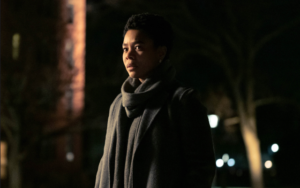MASTER: 3 ½ STARS. “deft social commentary elevates the horror.”
 Horror and social commentary are longtime bedmates. “Invasion of the Body Snatchers,” for example, is an allegory for 1950s fear of communism. “Frankenstein” warns of technology gone amok. More recently “Get Out” was a powerful condemnation of racism. “Master,” a new Regina Hall film now on Prime Video, confronts white supremacy in a story about legacy and the sins of the past.
Horror and social commentary are longtime bedmates. “Invasion of the Body Snatchers,” for example, is an allegory for 1950s fear of communism. “Frankenstein” warns of technology gone amok. More recently “Get Out” was a powerful condemnation of racism. “Master,” a new Regina Hall film now on Prime Video, confronts white supremacy in a story about legacy and the sins of the past.
“Master,” set at an upscale Massachusetts school built on land that was once the site of a Salem-era gallows, is the story of three African-American women. Liv Beckman (Amber Gray) is a literature professor battling against expectations and prejudices as she nears tenure. Gail Bishop (Regina Hall), is a tenured professor and the recently appointed student “Master.” “I am more than a professor,” she tells her students, “I am a confidante, an ally, a friend.”
Zoe Renee plays first-year student Jasmine Moore. When she arrives, she immediately becomes the talk of the campus as the new resident of room 302 in a co-ed dormitory called Belleville House. The other students whisper about supernatural activity and death in, what they ominously call, “the room.”
Each woman is forced to deal with a reckoning, whether it is the very real threat of insidious racism or the nightmarish reverberations of the Salem Witch Trials or both.
There are moments of stylish, elevated horror in “Master’s” handling of the historical haunting aspects of the story but it is in writer-director Mariama Diallo’s presentation of the allegorical dread of racism, microaggressions and exclusion experienced by the three lead characters that is truly terrifying.
The addition of real-life horror to the supernatural aspects of the tale deepens the movie’s effect, upping the atmosphere of unease and dread. The school’s current day institutional racism juxtaposed against the historical story of a bullied student who killed herself in Jasmine’s room decades ago because she thought a witch was stalking her, illuminates the privilege and bigotry in both timeframes.
“Master” is clunky at times, particularly near the end, but strong performances and deftly interwoven social commentary elevates the horror, exposing the ways that real life, injustice and privilege are often more disturbing than the ghostly realm.
